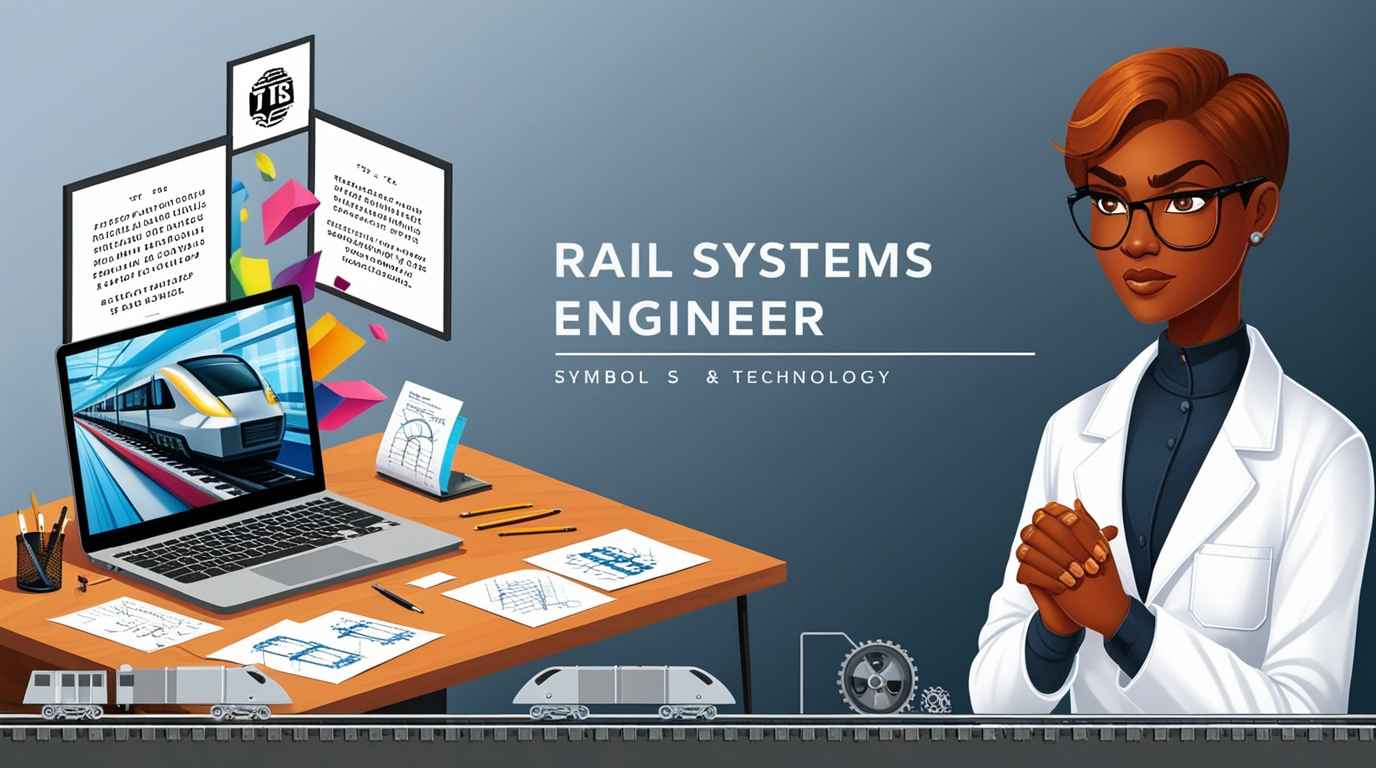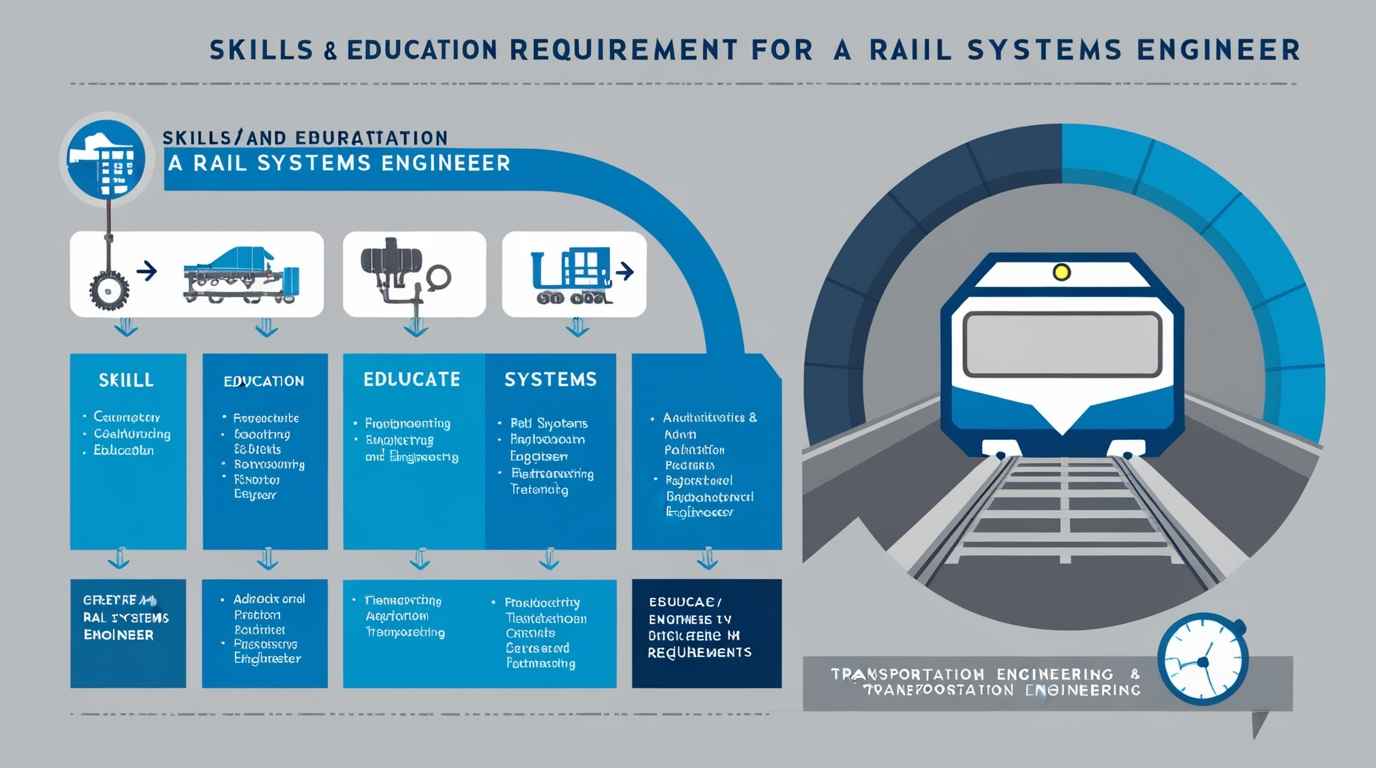rail systems engineer skills and education requirements
Exploring rail systems engineering shows how vital the right skills and education are. A rail systems engineer is key to making railways safe, reliable, and efficient. To do well, one needs technical, soft, and professional skills, along with the right qualifications.
To thrive in this field, understanding systems engineering and railway engineering is crucial. Employers look for knowledge of design standards like BS, HA, and NR. Also, having project management qualifications like Prince2 can boost your salary and career.
Key Takeaways
- Rail systems engineers need technical, soft, and professional skills to succeed.
- A Bachelor’s Degree in Electrical/Electronic Engineering or equivalent is the minimum educational requirement.
- 5 to 10 years of post-graduate experience in an operational environment is necessary.
- Proficiency in signalling, telecommunications, and electrical railway systems design is essential.
- Strong written and verbal communication skills are necessary for effective team management and mentoring.
- Continuing professional development opportunities are encouraged to stay up-to-date with industry trends and best practices.

Understanding the Role of a Rail Systems Engineer
A rail systems engineer is key in designing, building, and keeping up railway systems. The rail systems engineer job description includes setting and managing needs for railway systems and parts. They also pick design options and make sure the system is safe, works well, and lasts long.
To be a rail systems engineer, you need rail systems engineer training and the right rail systems engineer certification. You can get this through rail systems engineer courses that teach electrical, mechanical, and civil engineering. The rail transport industry is very important, moving over 1.7 billion tons of freight in the U.S. each year.
This job involves working with many people, like civil, electrical, and mechanical engineers. In the U.S., a rail systems engineer makes about $90,000 a year. To do well in this job, you must keep learning and know the newest trends and technologies.
| Industry Sector | Percentage of Freight Transported |
|---|---|
| Rail | 28% |
| Truck | 40% |
| Ship | 12% |
| Air | 2% |
Essential Educational Background and Degrees
To become a rail systems engineer, you need a degree in engineering or a related field. It’s best if it’s in systems engineering or rail engineering. A rail systems engineer degree is key for a successful career. Many start as network administrators or software engineers to learn system operations and gain rail systems engineer experience.
A bachelor’s degree in fields like Systems Engineering, IT, or Computer Science is needed for entry-level jobs. About 20% of systems engineers have a master’s degree or higher. This is in areas like software systems, transportation, or logistics. A rail systems engineer career path requires ongoing learning and professional growth to keep up with new technologies and methods.
Key skills and qualifications for a rail systems engineer include:
- Strong understanding of systems engineering principles and methods
- Familiarity with railway operations and regulations
- Proficiency in various tools for systems engineering tasks
- High level of attention to detail to ensure the quality and accuracy of engineering work
Technical Skills Required for Rail Systems Engineering
Being a rail systems engineer requires the right technical skills. You need a solid base in math and science. Also, knowing how to use various tools and software is key. Recent data shows that 70% of Systems Engineers say being good with systems modeling and simulation tools is vital.
Here are some important technical skills for rail systems engineering:
- Electrical and electronic systems knowledge, including experience with systems modeling and simulation tools
- Mechanical engineering fundamentals, such as understanding of mechanical systems and components
- Software and digital systems expertise, including proficiency in programming languages and software development methodologies
- Safety systems and regulations, including knowledge of industry standards and best practices
These skills help rail systems engineers create efficient and safe rail systems. With more jobs opening up, having the right skills is crucial. This includes both technical skills and the education needed to be a successful rail systems engineer.
Professional Certifications and Licensing
Getting the right certifications and licenses is key for a rail systems engineer’s career growth. The rail systems engineer certification is a top choice for showing off your skills. To get certified, you need to finish a rail systems engineer training and pass exams.
The Systems Engineering Professional (SEP) certification is a big deal for rail systems engineers. It requires you to take rail systems engineer courses and have some work experience. You’ll need to pass a knowledge and skills test, and keep up with continuing education to stay current.
Here are some perks of getting a rail systems engineer certification:
- Enhanced career prospects
- Increased earning potential
- Improved job satisfaction
- Opportunities for advancement
In short, getting a rail systems engineer certification is a big step up in your career. By finishing a rail systems engineer training and passing exams, you show you’re serious about your work. This opens up many benefits and opportunities.
| Certification | Requirements | Benefits |
|---|---|---|
| Systems Engineering Professional (SEP) | Complete rail systems engineer courses, pass exams, and have work experience | Enhanced career prospects, increased earning potential |
Rail Systems Engineer Skills and Education Requirements: A Complete Overview
To be a top rail systems engineer, you need technical skills, soft skills, and professional qualifications. The rail systems engineer job description involves designing, developing, and keeping rail systems running. This job needs a solid base in rail systems engineer skills and education requirements.
Mostly, you need a bachelor’s degree in engineering, computer science, or math to start. Employers also look for rail systems engineer qualifications like certifications or master’s degrees for more advanced roles.
Key skills and qualifications for rail systems engineers include:
- Fundamental engineering principles
- Specialized rail knowledge
- Project management capabilities
About 70% of rail systems engineers start with an undergraduate degree in a related field. Employers value work experience a lot. Many gain experience through part-time jobs or internships while studying.
Experienced rail systems engineers can make between £35,000 and £45,000. This is a 40% jump from what newbies earn. Senior engineers can make up to £70,000, showing a 100% increase from the beginning.
| Level of Experience | Salary Range |
|---|---|
| Entry-level | £25,000 – £35,000 |
| Trained | £35,000 – £45,000 |
| Senior | £45,000 – £70,000 |
Gaining Practical Experience in Rail Engineering
To become a successful rail systems engineer, getting practical experience is key. You can get this through internships, entry-level jobs, and mentorship programs. As I explore rail engineering, I see that practical experience is crucial for a successful rail systems engineer career path.
Here are some ways to get practical experience:
- Internship opportunities: Many companies offer internships to students and recent graduates. They get hands-on experience in rail engineering.
- Entry-level positions: Starting as a junior engineer or engineering assistant can give you valuable experience. It’s a step towards more rail systems engineer job opportunities.
- Mentorship programs: These programs offer guidance and support from experienced professionals. They help shape a successful rail systems engineer experience.
By getting practical experience, you can develop the skills and knowledge needed. This boosts your chances of success in your rail systems engineer career path.
| Experience | Benefits |
|---|---|
| Internship opportunities | Hands-on experience, networking opportunities |
| Entry-level positions | Valuable experience, foot in the door for future job opportunities |
| Mentorship programs | Guidance and support from experienced professionals |
Advanced Specializations and Career Growth
As a rail systems engineer, I can explore many advanced specializations to grow my career. With experience and learning, I can move up to senior positions or focus on areas like signaling systems. The rail systems engineer career path has many chances for advancement, including rail systems engineer job opportunities in management, consulting, or research.
To stay ahead, I can get rail systems engineer advanced degrees, like a Master’s or Ph.D. in a related field. This gives me the skills for complex projects and leadership roles. Some specializations for rail systems engineers include:
- Signaling systems engineering
- Rolling stock management
- Infrastructure design and development
- Systems integration and testing
By going for these advanced specializations and degrees, I can boost my skills and knowledge. This opens up more rail systems engineer job opportunities. The need for skilled rail systems engineers is high. With the right education and experience, I can have a fulfilling career in this field.
Industry Trends and Future Skills Requirements
As a rail systems engineer, it’s key to keep up with the latest rail systems engineer industry trends and future skills needs. The rail sector is always changing, with new tech and green rail systems gaining more importance. About 60% of rail systems engineers have a Bachelor’s in Engineering or a similar field. There’s a big demand for these skilled engineers, with a 12% job opening increase expected in North America over the next five years.
To stay ahead, rail systems engineers need to learn rail systems engineer future skills. This includes being good with computer-aided design (CAD) software and knowing about railway signalling systems. In fact, 70% of current engineers say CAD skills are vital, and 65% highlight the need for signalling system knowledge. The rail systems engineer emerging technologies will also shape the industry’s future, focusing on automation and digital systems.
Here are some key stats on why it’s crucial to keep up with industry trends and future skills:
- 80% of employers in the rail industry value hands-on experience with rail system projects more than just theoretical knowledge.
- 55% of rail systems engineers think it’s essential to keep learning and getting certified in new tech for career growth.
- 75% of rail tech advancements will focus on automation and digital systems, so engineers need to develop skills in these areas.
| Skill | Importance |
|---|---|
| Computer-aided design (CAD) software | 70% |
| Railway signalling systems | 65% |
| Automation and digital systems | 75% |
Conclusion: Building Your Career as a Rail Systems Engineer
To become a successful rail systems engineer, you need a solid base in engineering and rail knowledge. You also need to manage complex projects well. By getting the right education, developing technical skills, and gaining experience, you can have a fulfilling career in this field.
The rail systems engineering field offers many chances for growth, with good job opportunities and salaries. Places with big rail networks and transportation centers need skilled people like you. Also, the push for green and fast rail systems opens up new career paths.
To thrive in this career, keep learning and growing professionally. Get more certifications, stay current with trends, and find mentors. With hard work and the right skills, you can become a respected rail systems engineer.
FAQ
What are the core responsibilities and duties of a rail systems engineer?
As a rail systems engineer, I manage the needs of railway systems. I pick the best designs and make sure the system is safe and works well. I work on projects like new lines and upgrades.
What kind of impact do rail systems engineers have on transportation infrastructure?
I help shape the transportation system by designing railways. My work makes the rail network safe, efficient, and green. It’s key for good public transport.
What is the industry overview for rail systems engineers?
The rail industry is always changing. As an engineer, I keep up with new trends and rules. This ensures my designs are top-notch and meet safety standards.
What kind of educational background and degrees are required for a rail systems engineer?
To be a rail systems engineer, I need a degree in systems engineering or a related field. Specializing in systems or rail engineering is a plus. Getting certified can also boost my career.
What technical skills are required for rail systems engineering?
I need to know a lot about electrical and mechanical systems. I also need to understand software and safety rules. Being good with engineering tools is important too.
What professional certifications and licensing are required for rail systems engineers?
Having certifications like the Systems Engineering Professional (SEP) shows I’m skilled. These are highly valued and can help my career.
How can I gain practical experience in rail engineering?
Practical experience is key. I can get internships, entry-level jobs, or find mentors. Learning from others helps a lot.
What advanced specializations and career growth opportunities are available for rail systems engineers?
With experience, I can move up or specialize. The field is always changing, so staying updated is crucial for growth.
What are the industry trends and future skills requirements for rail systems engineers?
The rail industry is changing fast, with new tech and a focus on green systems. I need to keep learning to stay ahead in this field.

